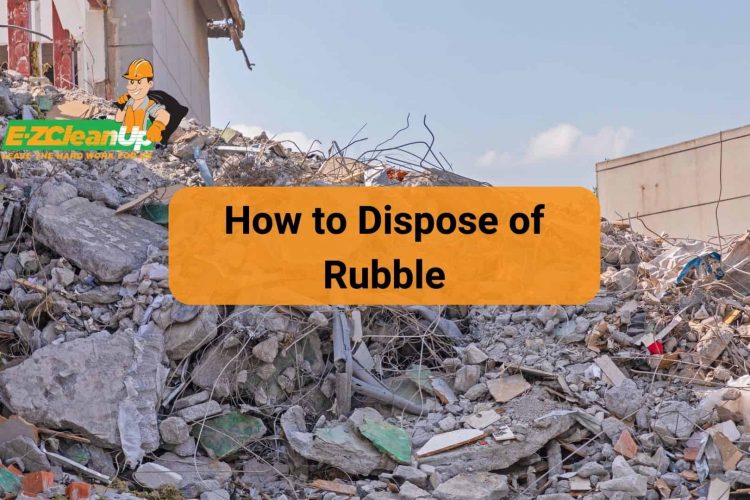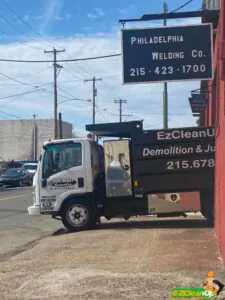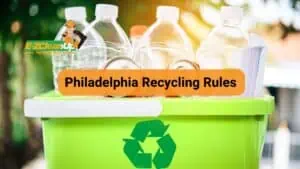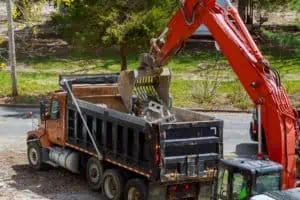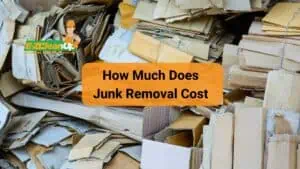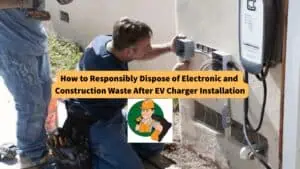To dispose of rubble efficiently, consider recycling, donating, or hiring professional waste management services. Ensure compliance with local regulations and prioritize safety measures for handling hazardous materials.
Explore more ways on how to dispose of rubble in this guide.
Options for Disposing of Rubble
Rubble is the collective term for the waste generated from construction, renovation, repair, and demolition activities. This waste can include a wide range of materials, such as concrete pieces, bricks, wood, metal, and earth. It’s the stuff left over when buildings, roads, and bridges are built, renovated, or torn down.
Various disposal methods cater to different types of rubble, each with specific considerations for environmental impact, regulatory compliance, and potential for reuse or recycling.
1. Landfills and Dumping
Landfills are designated areas where waste is isolated from the environment until it is safe. They are regulated to prevent contamination of soil and water. Construction and demolition (C&D) waste, including concrete, asphalt, and wood, can be processed differently from regular waste.
However, not all materials are suitable for landfill disposal, especially hazardous waste, which requires special handling.
2. Recycling Rubble
Recycling transforms waste materials into new products. It conserves natural resources and reduces the need for landfill space. C&D materials like concrete, asphalt, wood, and metals can be recycled at specialized facilities.
3. Donation
Donating rubble offers a way to repurpose materials such as furniture, appliances, and other unneeded building materials. Organizations like Habitat for Humanity accept such donations, using them to build affordable housing. This method supports community development, reduces waste, and aids in resource conservation.
4. Professional Waste Management Services
Professional waste management services like us at EZ CleanUp, provide expertise in handling, sorting, and disposing of or recycling rubble. We can handle all types of construction waste as long as they don’t have any hazardous materials or chemicals in them. Moreover, we ensure that waste is managed in compliance with local and federal regulations to minimize the environmental impact.
When selecting a service provider, consider their experience, certifications, and adherence to regulatory standards. These services can be particularly beneficial for large-scale projects. There are also specific waste management services that deal with hazardous materials.
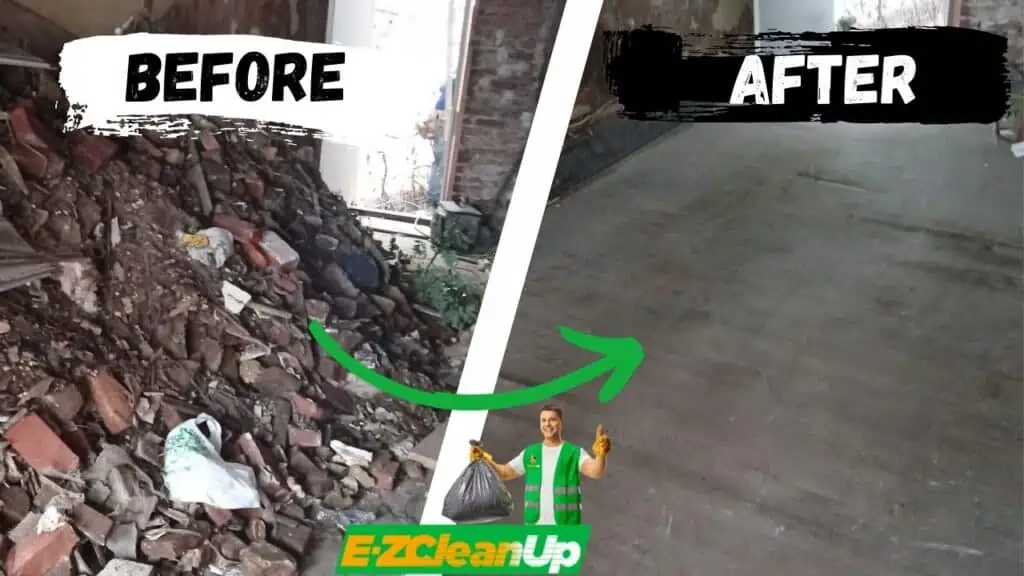
DIY Disposal Strategies
For individuals tackling construction, renovation, or demolition projects on their own, managing the resulting waste efficiently and safely is crucial. Implementing DIY disposal strategies helps maintain a clean environment. Plus, it ensures compliance with local regulations and supports recycling efforts.
Sorting and Separating Waste
Different materials like metals, wood, concrete, and hazardous items like asbestos should be categorized separately. This separation is crucial for recycling processes and for handling hazardous waste appropriately. Non-hazardous materials such as concrete, bricks, and untreated wood can often be recycled.
Preparing Rubble for Disposal or Recycling
Preparing rubble involves breaking down larger pieces into manageable sizes, which might require the use of hammers, saws, or grinders. It’s essential to remove any hazardous materials to ensure safe disposal or recycling.
Safety Measures and Equipment
Protective gear such as gloves, goggles, and masks is essential to protect against dust, sharp objects, and hazardous materials. Ensuring the safe use of tools and machinery for breaking down waste is also critical to preventing injuries.
When dealing with hazardous waste like asbestos or lead, specialized handling and disposal methods must be followed to avoid health risks and environmental contamination.
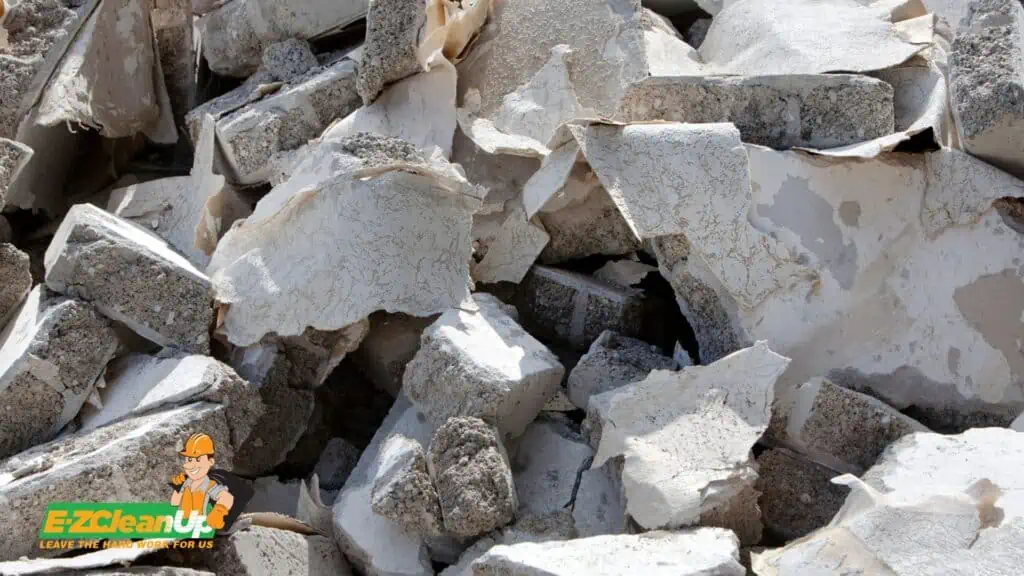
Community and Government Resources
Utilizing local and government resources can significantly aid in this task. They offer a variety of services and incentives to ensure proper waste management.
Local Waste Disposal Facilities and Hours of Operation
Local waste disposal facilities, including landfills and recycling centers, are foundational in managing community waste. It’s always recommended to contact these facilities directly or visit their websites for the most current information and guidelines.
Community Recycling Programs
Community recycling programs play a vital role in reducing landfill waste and conserving resources. Many communities, including King County, WA, provide extensive recycling services at various facilities.
They accommodate a wide range of materials, from household waste to specific recyclables like electronics and hazardous materials. These programs often include curbside recycling services and drop-off locations. All these are tailored to meet the community’s needs and environmental goals.
Government Incentives for Eco-Friendly Disposal
Government incentives are designed to promote eco-friendly disposal practices. These can range from grants and financial assistance for waste reduction, recycling, and composting initiatives to tax credits or rebates for adopting sustainable disposal methods.
While specific incentives vary by location, they are generally aimed at encouraging both individuals and businesses to engage in practices that reduce environmental impact and support public health and safety.
Best Practices for Rubble Disposal
Here are the best practices derived from industry guidelines and sustainable waste management strategies for efficient and sustainable rubble disposal.
Minimizing Waste during Construction or Renovation
Minimizing waste begins with thoughtful planning and design. This aims to use materials efficiently and reduce unnecessary waste. Incorporating modular construction techniques and prefabricated components can significantly reduce waste generation.
Additionally, adopting an integrated design approach from the project’s onset ensures material optimization and waste reduction. It emphasizes the use of building information modeling (BIM) to include material information and life-cycle analysis embedded in the design process.
Guidelines for Environmentally Responsible Disposal
Environmentally responsible disposal practices involve prioritizing source reduction, which minimizes life-cycle material and energy use. It’s crucial to salvage and reuse construction and demolition (C&D) materials wherever possible, recycling the materials that cannot be reused.
For instance, concrete, wood, asphalt, and metals from C&D activities can be diverted from disposal and managed for new productive uses. The move supports the construction sector’s shift towards sustainable material management.
Engaging in practices that support deconstruction and selective demolition can further facilitate the reuse and recycling of C&D materials.
Tips for Efficient and Cost-Effective Disposal of Rubble
To achieve efficiency and cost-effectiveness in rubble disposal, several strategies can be employed aside from what has already been mentioned above:
- Sell Surplus Materials: One effective way to dispose of construction waste is by selling surplus or overstocked materials post-project. This can include scrap metal, lumber, and even fixtures from commercial projects. Platforms like Craigslist and DiggersList are good places to start.
- Adopt Waste-to-Energy Systems: Converting organic material into energy through thermal or biological processes can serve as an alternative to landfilling, especially for organic materials like wood chips and sawdust.
- Composting Organic Materials: Composting wood chips and sawdust can reduce greenhouse gas emissions and improve soil health. It helps turn waste into valuable compost for fertilization.
- Implement a Waste Management Plan: Developing a comprehensive plan that assesses waste types, reduction strategies, and disposal methods is essential. Involving all stakeholders ensures that environmental impacts are considered and managed effectively.
- Focus on Source Reduction: Reducing waste at the source is crucial. This can involve using fewer materials, choosing sustainable materials, and designing buildings that require less material or can be easily dismantled and reused.
- Engage in Diverting and Reusing: Redirecting waste for resources and reusing valuable building materials not only conserves resources but also offers economic benefits by saving on new material costs.
Types of Rubble: An Overview
Each type of rubble has its own set of recycling and disposal strategies, which can significantly reduce the environmental impact of construction activities.
Construction Debris
Construction debris includes materials like bricks, concrete, wood, metals, and glass, generated during new construction or the expansion of existing structures. A significant portion of construction waste can be recycled or reused.
For instance, concrete and bricks can be crushed into rubble for use as aggregate materials in new construction projects. Wood from construction sites can be repurposed, recycled, or used as bioenergy.
Demolition Waste
Demolition waste primarily consists of debris from the demolition of buildings and infrastructure. It includes a mix of materials such as concrete, wood, metal, and bricks. Special attention is needed for hazardous materials like asbestos and lead, which require separate disposal.
Much of the demolition waste, like concrete and brick, can be recycled into materials for road bases or new construction materials.
Renovation Scraps
Renovation scraps arise from the remodeling or upgrading of existing buildings, involving materials such as flooring, fixtures, and wall coverings. These materials can often be reused or donated to organizations that specialize in repurposing construction materials.
For example, old doors, windows, and fixtures can find new life in other construction or renovation projects.
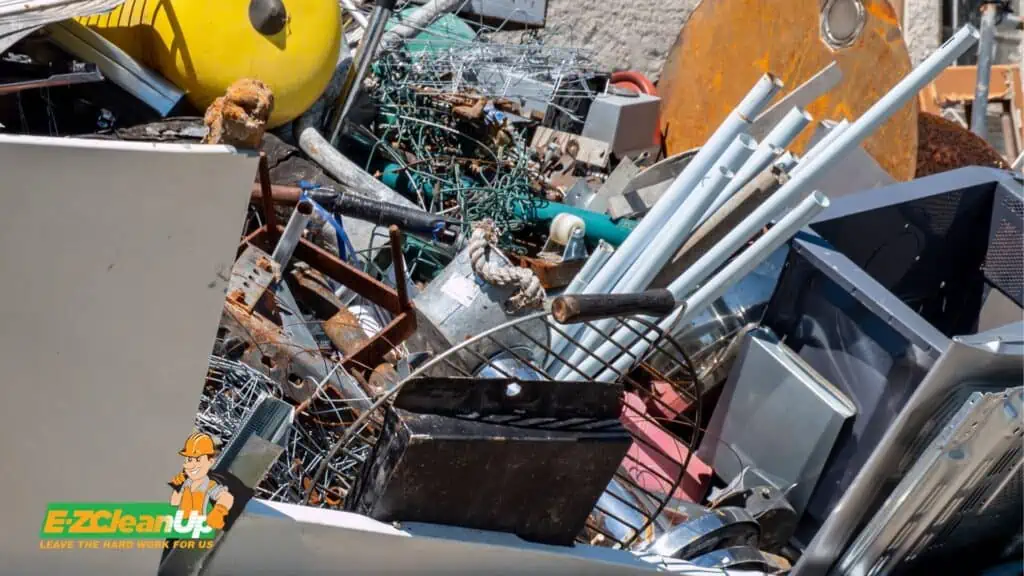
Repair Materials
Materials left over from repair jobs, including patches, replaced elements, and surplus materials, fall into this category. Similar to renovation scraps, these materials can often be reused or recycled, depending on their condition and material type.
Legal and Environmental Considerations
Navigating the landscape of rubble disposal requires an understanding of both federal and state regulations as well as the environmental impacts of improper disposal practices.
Federal Regulations on Rubble Disposal
The Environmental Protection Agency (EPA) sets the federal framework for waste management. It emphasizes the sustainable management of construction and demolition (C&D) materials.
These regulations encompass a broad range of materials generated from construction, renovation, and demolition activities, including concrete, wood, asphalt, and more. The EPA advocates for practices that reduce, reuse, and recycle C&D materials to minimize the amount directed to landfills.
State-Specific Guidelines
While the EPA provides federal oversight, individual states may implement more stringent regulations for rubble disposal. These state-specific guidelines can vary significantly. They cover aspects such as the handling of hazardous waste and recycling requirements.
For example, industrial and C&D landfills are subject to both federal standards and potentially more rigorous state regulations. These landfills are designed for non-hazardous industrial waste and C&D debris, respectively, with specific exclusions for hazardous waste to ensure safe and compliant disposal practices.
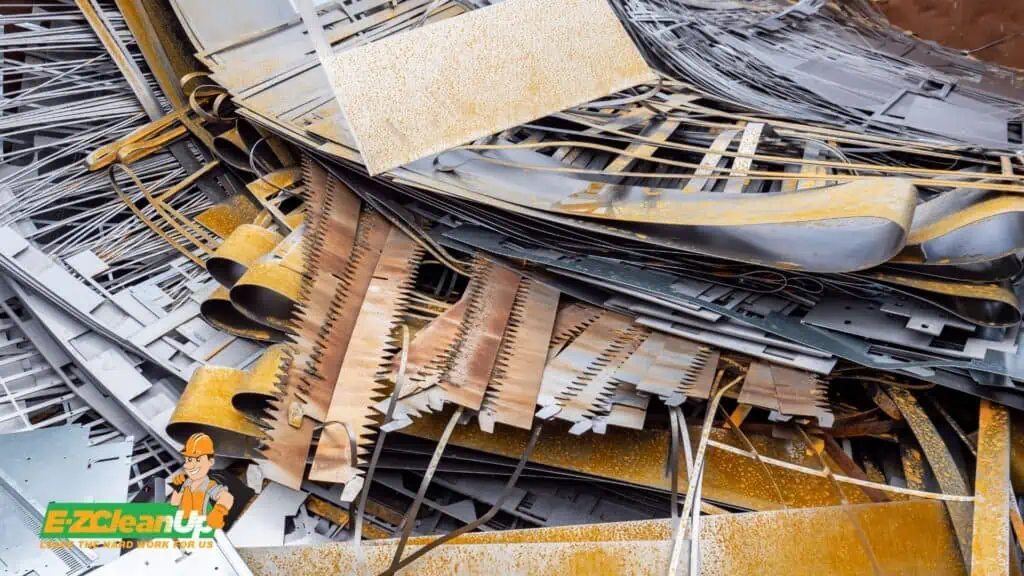
Environmental Impact of Improper Disposal
Improper disposal of rubble can lead to serious environmental repercussions. Contaminants from rubble can pollute soil and water sources, disrupt habitats, and contribute to air pollution.
For instance, hazardous materials like asbestos and lead can pose health risks during demolition and must be managed according to safety guidelines to prevent exposure. The EPA provides guidance on dealing with debris and damaged buildings.
It includes the proper disposal of hazardous materials and the importance of drying out buildings to prevent mold growth. This highlights the complexities of disaster response and the necessity of adhering to environmental safety practices.
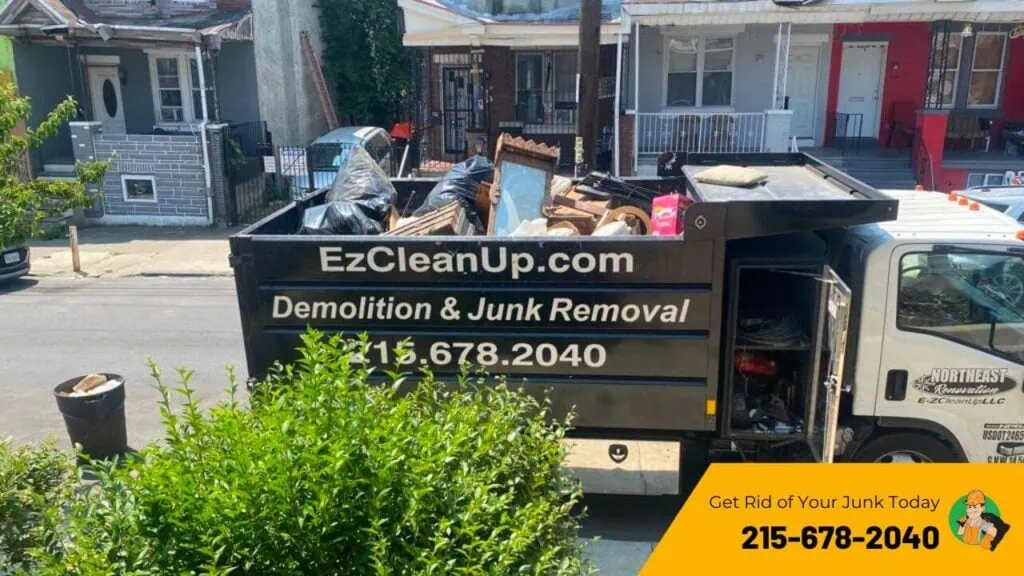
Rubble Trouble No More with EZ
As more people become aware of sustainability, the importance of responsible rubble disposal cannot be overstated. By embracing recycling, donating usable materials, and employing professional waste management services like us at EZ CleanUp, we can significantly reduce the environmental impact of construction projects.
Remember, not all waste fits in a bin—especially large items like bulky construction debris. For your rubble junk, EZ CleanUp offers tailored solutions, including professional demolition waste management and dumpster rental services. Let’s prioritize the health of our planet by choosing eco-friendly disposal methods. Call us to learn more.

